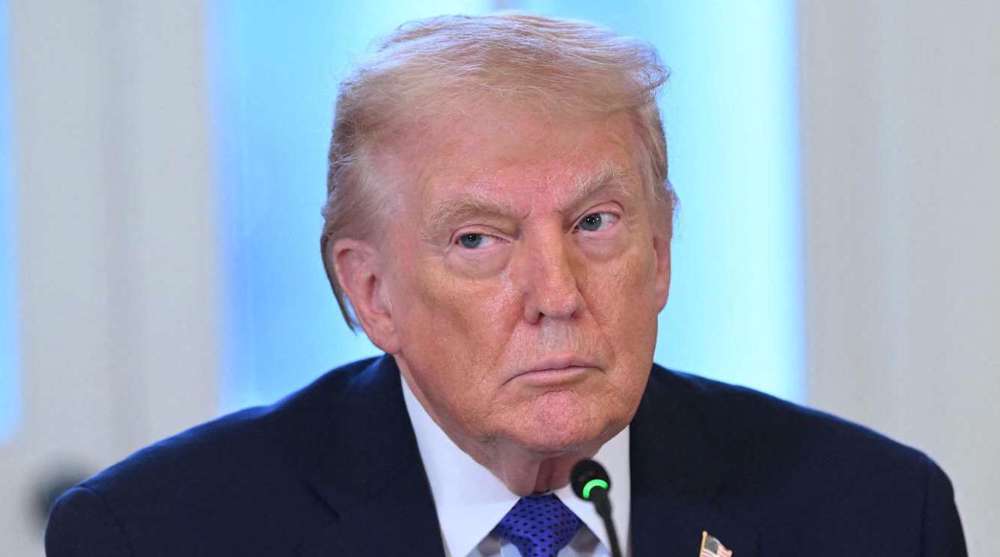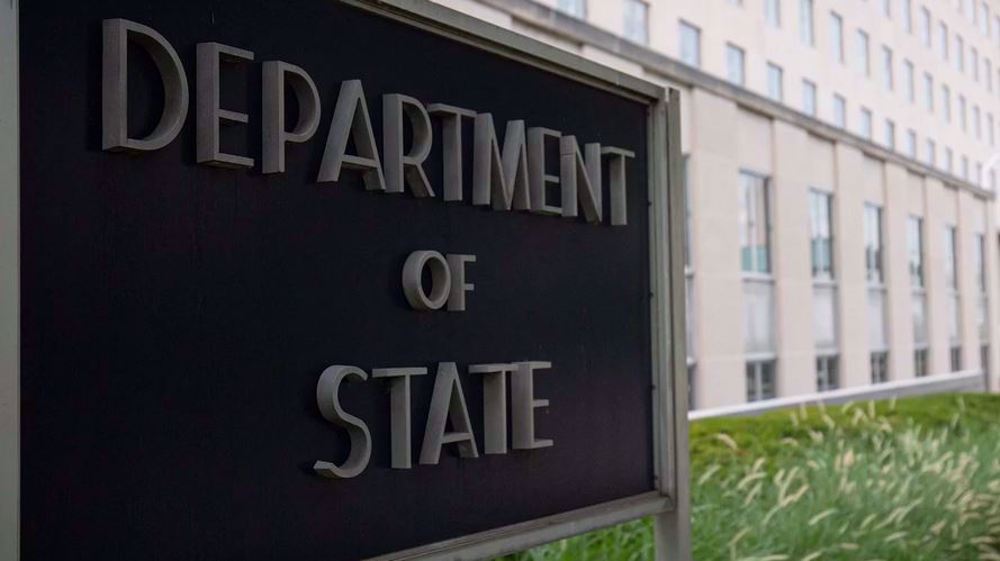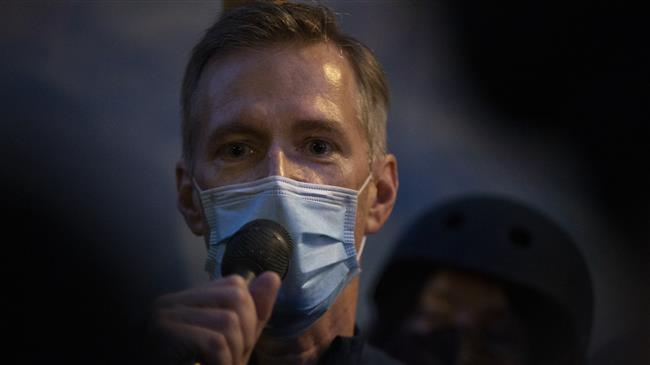Politics of fear finds home in US 2020 presidential campaign
Democrats and Republicans are both playing up messages of fear amid the pandemic and protests against racial injustice as they chart a path toward the November election.
Former Vice President Joe Biden is promising to unite the country, while warning that President Trump is cloaking America in “darkness” and stoking fear and division. More suffering and economic pain from the coronavirus is in store, Democrats argued during last week’s convention, if voters hand Trump a second term.
Republicans sought to counter that argument throughout their convention this week by making dire predictions that a Biden administration would allow violence and chaos to spread, describing Trump as the leader of “law and order” as protests turned violent in Kenosha, Wisconsin, following the police shooting of Jacob Blake, a Black man.
At each convention, speaker after speaker painted ominous pictures of what would happen if the other side captured the White House in November, charging that their political opponents would fundamentally – and perhaps irreparably – alter the country and its democratic and cultural norms.
The GOP convention consistently sought to paint Biden as a vessel for a socialist agenda that would weaken public safety.
Kimberly Guilfoyle, a former Fox News host and top Trump surrogate, decried in an impassioned speech on the first night of the four-day convention that Biden, his running mate Senator Kamala Harris (D-Calif.) “and the rest of the socialists will fundamentally change this nation.”
“They want open borders, closed schools, dangerous amnesty, and will selfishly send your jobs back to China while they get rich,” Guilfoyle said. “They will defund, dismantle and destroy America’s law enforcement. When you are in trouble and need police, don’t count on the Democrats.”
Trump asserted in his 70-minute acceptance speech Thursday evening that the upcoming election “will decide whether we will defend the American way of life, or whether we allow a radical movement to completely dismantle and destroy it.”
Meanwhile, Democrats tore into Trump’s character and his response to the coronavirus, which has killed more than 180,000 people in the U.S.
In his nearly 25-minute speech accepting the Democratic presidential nomination, Biden accused Trump of stoking “anger,” “fear” and “division.”
“I’ll be an ally of the light, not the darkness. It’s time for us, for we the people, to come together. And make no mistake, united we can and will overcome this season of darkness in America. We’ll choose hope over fear, facts over fiction, fairness over privilege,” Biden said.
Former President Obama also issued a searing rebuke of Trump, casting him as a threat to American democracy.
Fear has been front and center in some previous presidential races.
In 1968, Richard Nixon ran on a platform of “law and order,” similar to what Trump is now espousing. Forty years later, both Obama and Senator John McCain (R-Ariz.) channeled fear felt by Americans because of the economic recession and the war in Iraq.
But there’s a different dynamic this time around, said Julian Zelizer, a political history professor at Princeton University.
“The difference is, usually there is optimism spread into the mix. I think politicians usually assume you need some optimism for voters to feel good about voting,” he said. “This election certainly leans toward the emphasis on fear and doom.”
Political operatives and strategists from both parties acknowledged the grim undertones of the 2020 conventions. But they said the messaging was appropriate, if not necessary, in an election year marred by a pandemic, economic anxiety and widespread civil unrest over racial injustice and police brutality.
“Americans are overwhelmingly thinking the country is headed in the wrong direction. It would be weird if either party presented a picture that suggested otherwise,” said Alex Conant, a Republican consultant and former communications director for Senator Marco Rubio’s (R-Fla.) 2016 presidential campaign.
Jonathan Tasini, a progressive strategist and former national surrogate for Senator Bernie Sander’s (I-Vt.) 2016 presidential campaign, said that with the current national crises, Democrats are seeking to make the election a “referendum on Trump” and that the convention is a high-profile way “to define the other side as well as to define your candidate.”
“I do think they want to make this obviously a referendum on Trump, and I think that that’s very powerful. There are thousands of people who are dead today because Trump is president,” he said. “In some ways, this election is no different than any other election. You have to turn out your voters.”
A survey from the Associated Press-NORC Center for Public Affairs Research released late last month found that 80 percent of Americans believed the country was on the wrong track, more than at any other point during Trump’s presidency. Polls have consistently shown broad disapproval for Trump’s handling of COVID-19.
“Democrats are counting on the animosity and anger toward the president to encourage voters to hire him and fire Biden,” said Democratic strategist Basil Smikle.
Meanwhile, Republicans are hoping that tying Biden to the disorder in American cities will help Trump at the ballot box.
“The more chaos and anarchy and vandalism and violence reigns, the better it is for the very clear choice on who's best on public safety and law and order,” outgoing White House counselor Kellyanne Conway said Thursday on Fox News.
The president and his allies have blamed the unrest on “Democrat-run” metropolitan areas and asserted that Biden is aligned with the “defund the police” movement that some Democrats support, but one that’s rejected by Biden.
Meanwhile, Trump has tried to recast his response to the virus in a positive light, while largely treating COVID-19 as if it’s in the rear-view mirror. He’s also mostly avoided discussion of racial injustice, choosing instead to talk about violent protests in his speech Thursday without specifically mentioning the Blake shooting.
“We’re in a dark time. 180,000 people have died. The economy is a mess. You can’t sugar coat that. And if you’re Trump, you’re never going to take blame for any of that, so you need to turn it against Biden somehow,” said Doug Heye, former spokesman for the Republican National Committee, who argued that both parties are taking risks by not putting forth an “uplifting, forward-looking” message.
The candidates now head into the final two-month stretch before Election Day, with the presidential debates starting at the end of September. Trump will crisscross the country for campaign stops as he has been doing, and Biden plans to resume travel after Labor Day following a hiatus from the trail. Polls show Biden with a lead nationally and in key swing states, but the race appears to be tightening.
Zelizer, the Princeton professor, said both sides have put forth arguments that could help them win in November. Obama’s portrait of Trump as a threat to Democracy could help mobilize liberal voters, he said, while the GOP warnings on socialism might have the dual effect of driving conservative voters to the polls and convincing others to stay home.
The electoral outcome, Zelizer said, would be decided by “not who can inspire voters, but who can convince voters that the other side is a lot worse for the country.”
(Source: The Hill)
VIDEO | South Koreans demand end to joint US military drills and provocative policy against North Korea
VIDEO | A silent grief: Palestinian man struggles to recover remains of wife, children
Hind Rajab Foundation files complaint against Israeli genocidal propagandist in US
VIDEO | Trump fighting allies on Greenland
Iran FM: Selective respect for deals now haunting Europe
Arab rights group urges UK to sanction Netanyahu over 'incitement to genocide' in Gaza
‘Political, non-constructive’: Iran slams UNHRC special session on recent riots
Forced evacuations in South Gaza as Israeli military expands control over land
















 This makes it easy to access the Press TV website
This makes it easy to access the Press TV website